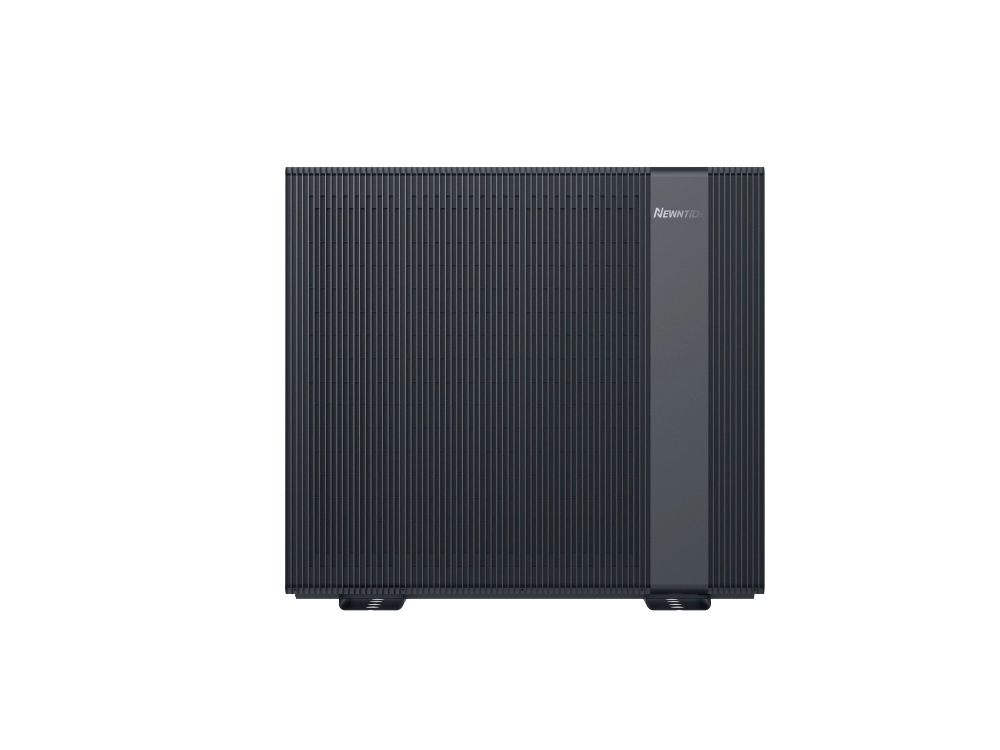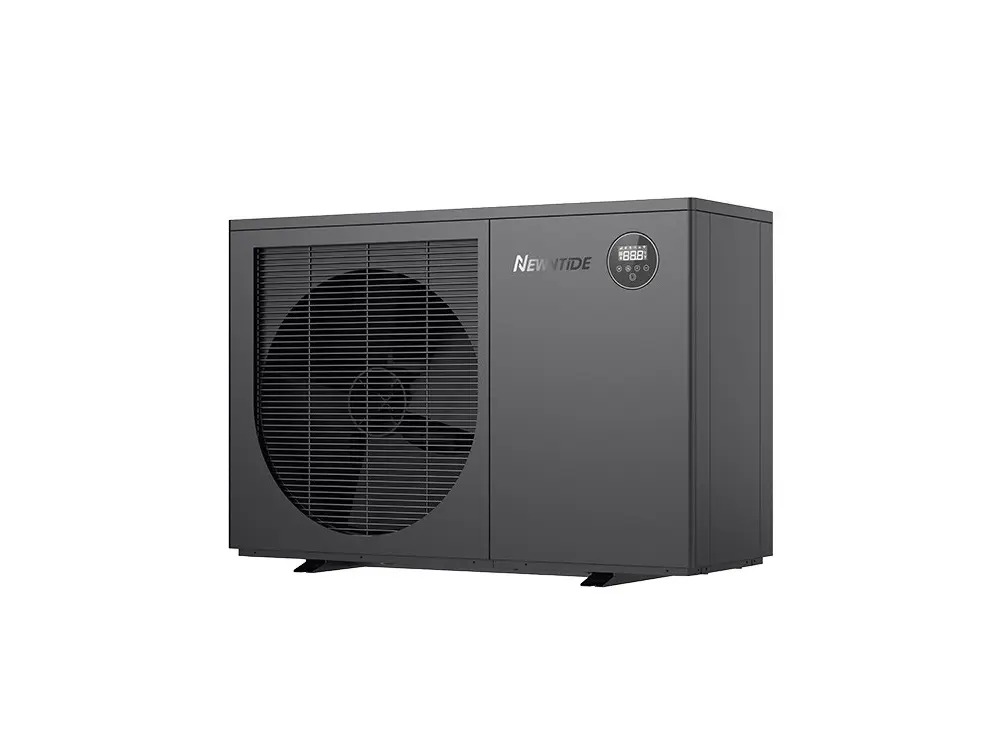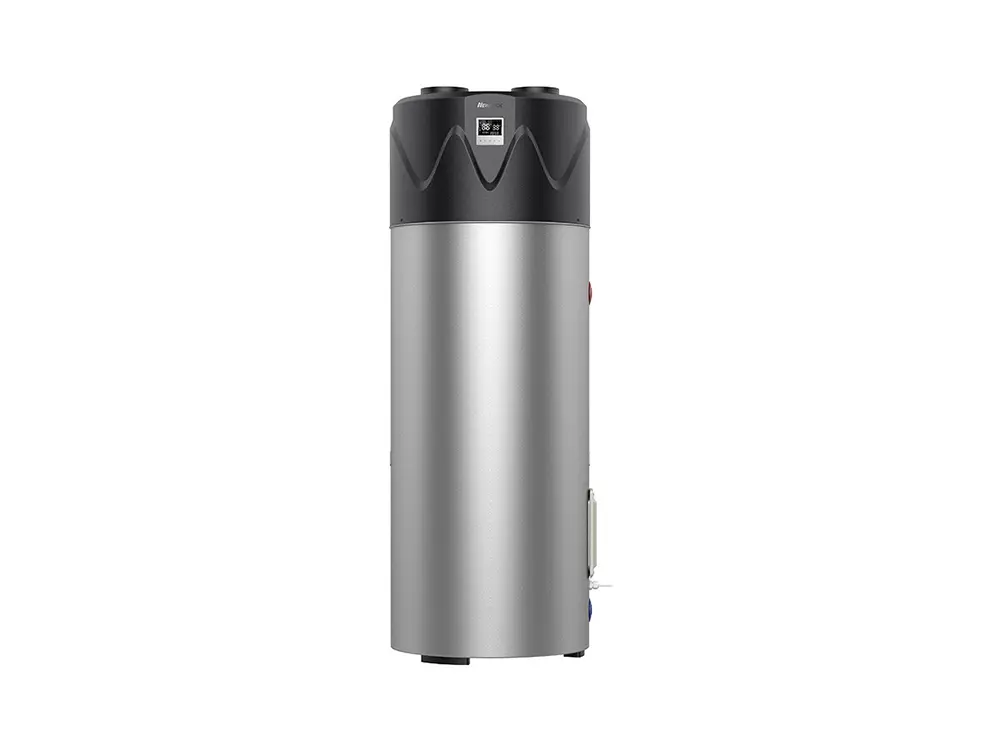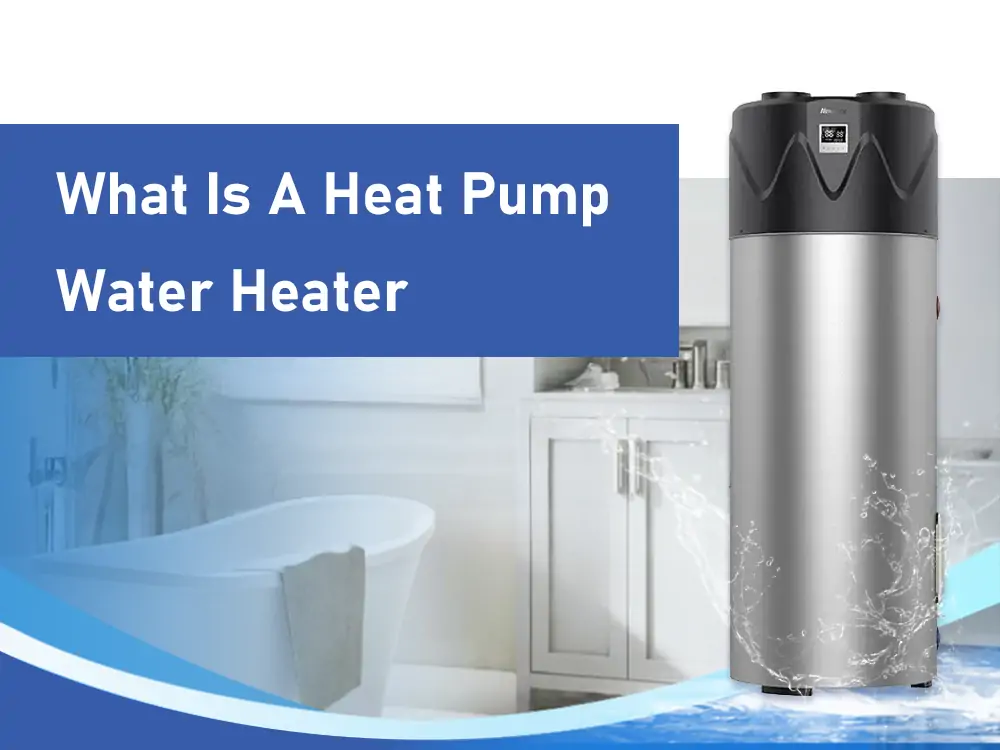Introduction
You may know that there are differing water heater types. These devices produce hot water for household use, including showers, dishwashing, and sinks.
Among them, a type that’s witnessing raised demand throughout Europe is a heat pump water heater. Such a device heats water only. Meanwhile, heat pump systems, like air-source and ground-source varieties, deliver space heating, cooling, and hot water.
Here, we’ll extensively explore heat pump water heaters. You’ll grasp their working principles, components, advantages, disadvantages, and more. You’ll also be acquainted with other water heater types.
What is a Heat Pump Water Heater?
A heat pump water heater is an appliance that heats water for domestic use. It employs electricity to draw heat from the exterior or surrounding air and then transfers it to water in a tank or cylinder.
Thus, heat pump water heaters are frequently used in households with a dry heat system. Here, heat is distributed in hot air, which is pumped into the household via ducts or vents.
Households with wet heat systems don’t necessitate a distinct system only for hot water. Here, heated water is distributed to radiators. Thus, they can use a heat pump, like its air-source or ground-source variants. It can meet the household’s hot water and heating requirements.
Unlike conventional water heaters, heat pumps water heaters don’t create heat energy directly. They only transport heat from one place to another place. That makes them increasingly energy efficient than other water heater variants.
How does a Heat Pump Water Heater Work?
The operation of such a device is based on a refrigeration cycle. It utilizes heat from the exterior or surrounding air to heat water.
The fan installed inside the unit draws heat from wherever the system is located. It then blows it over the evaporator coil, which is laden with refrigerant.
The marginally warmed refrigerant turns into a vapor and is pumped by a compressor, which raises its pressure and temperature.
The heated refrigerant then moves across a condenser coil, which is located inside or wrapped around the water tank. The hot refrigerant conveys its heat energy to the water.
Accordingly, the refrigerant cools down and condenses into a liquid. It then reverts to the evaporator coil. The cycle commences again by drawing in heat from the surroundings or outside.
Components of a Heat Pump Water Heater
Such a system comprises varying components. These components work together to accomplish a unified motive, i.e., hot water provision. These are:
- Water tank: It stores heated water for use later.
- Evaporator coil: It’s usually near the heat pump water heater’s top. It acts as a heat exchanger and draws heat energy from the surrounding air.
- Refrigerant: This is a circulating fluid that extracts heat from the surroundings and transfers it to water in the tank.
- Compressor: This is usually located at the appliance’s top. It compresses and pressurizes the refrigerant to enable it to transfer heat effectively.
- Condenser coil: It usually lies around or the water tank’s inside. It facilitates heat transfer. Here, the refrigerant cools down, loses pressure, and becomes a liquid.
- Fan: It’s positioned at the heat pump water heater’s top. It captures warm air from the surroundings. The warmed air then passes across the evaporator coil.
- Thermostats: The device generally comprises two thermostats. One lies at the water tank’s bottom, while the other lies at its top. They control the system’s operation, assuring the water is at the preferable temperature.
- Cold water inlet: This allows cold water to enter the device from the water supply.
- Hot water outlet: The heated water within the water tank exits by way of it. It links to pipes that provide hot water to outlets in your household, e.g., showers.
Types of Water Heaters
Let’s also understand the different water heater types as we focus on heat pump water heaters. These are:
1. Electric Water Heaters
An electric water heater is an appliance employing electricity to heat water for domestic usage. It does this via electric heating elements.
Electric water heaters typically have better efficiency than gas water heaters. But they usually don’t
produce hot water rapidly.
2. Solar Water Heaters
Solar water heaters heat the water in a household by exploiting the sun’s heat. They are environmentally friendly and can save household owners on energy bills. But they heat water slowly and run out rapidly on average.
Such devices comprise photovoltaic panels (generally installed on a household’s roof) and a water tank. It also employs a heat transfer fluid. It transfers its heat to water stored in the tank.
3. Gas Water Heaters
A gas water heater is a household device that employs natural gas or liquid propane. Such a device heats water via the burning of gas or the combustion process.
The water can be warmed inside a storage tank. It could further be a tankless system. Such a system heats water on demand as it streams via the unit.
Gas water heaters tend to heat water effectually and quickly. They can still operate amidst a power outage. Furthermore, they typically involve more upfront costs than electric water heaters.
4. Heat Pump Water Heaters
Such water heater systems collect ambient warmth from the air. They then compress it to heat the water. It also results in noteworthy cost savings and efficiency for heating water than other methods. Yet, such heat pump for water heating requires more time than conventional water heaters.
Cost of Heat Pump Water Heaters
The average cost of heat pump water heaters ranges between £1400 and £4100. Essentially, these water heaters are more economical than other heat pump types. These typically encompass air-source and ground-source heat pump varieties.
The precise prices rely on factors like heat pump hot water heater size. It means the amount of water it can process (in liters). That’s also reliant on brand, model, and installation complexity.
A two-bedroom household typically requires a water tank of approximately 150 liters. The cost of a heat pump water heater of that size ranges between £1700 to £2500.
The following table denotes the average prices of such systems. It concerns household size and system size:
| Household size | Heat pump water heater size | Cost |
| One-bedroom | 120 liters | Between £1400 and £2000 |
| Two bedrooms | 150 liters | Between £1700 and £2500 |
| Three bedrooms | 180 liters | Between £2100 and £3000 |
| Four bedrooms | 250 liters | Between £3000 and £4100 |
Advantages of Heat Pump Water Heaters
Now let’s probe into some noteworthy upsides of heat pump water heaters. These are:
1. More efficient
Heat pump water heaters have a substantial advantage concerning energy efficiency. This is especially true compared to their nearest counterparts, electric water heaters.
Heat pump water heaters are generally 300% efficient. Thus, each unit of energy consumed gives rise to three units of heat.
Contrary to this, electric water heaters are typically 100% efficient. Hence, you’ll commonly use three times less electricity with a heat pump water heater.
2. Longer lifespan
Heat pump water heaters are more durable than electric or gas water heaters. If well maintained, they can last up to 15 years, while their counterparts typically endure for 10-12 years.
That makes such a system a sustainable, durable, and reliable water heating option.
3. Tax benefits and rebates
Economic incentives like tax benefits and rebates are also available for heat pump water heaters in different European countries, such as France, Finland, and Sweden. These measures encourage more people to install such systems.
Take Sweden, for example. The country offers 30% tax rebates on labor costs for heat pump system installations.
4. Environmentally friendly
Another upside of heat pump water heaters is their environmental friendliness. They use electricity to transport heat rather than using conventional fossil fuels like gas.
Moreover, such systems don’t produce toxic emissions or gas leaks. They also produce fewer greenhouse gas emissions than conventional gas water heaters, contributing to a worthwhile reduction in one’s carbon footprint.
Disadvantages of Heat Pump Water Heaters
Besides advantages, heat pump water heaters also have some disadvantages that are important to know. These are:
1. Higher upfront cost
The biggest downside of such systems is the higher upfront cost. Typically, they are priced around £1000 more than electric and gas water heaters.
That makes such systems expensive and out of budget for some household owners, even though they eventually bring noteworthy energy savings.
2. Space requirements
A heat pump water heater necessitates plentiful space for installation. It requires to be installed near an external wall. The purpose is to allow for venting. That can further make the installation of such a system complex.
Hence, it may not be suitable for all households. It’s mainly for older or tight-spaced households.
3. Climate restrictions
You know that heat pump water heaters take advantage of the outside air. The motive is to absorb heat energy. Thus, their efficient working may be affected in regions with exceedingly cold climates.
It implies that, in such cold conditions, their efficiency can diminish notably. They require more energy to provide adequate hot water.
Are Heat Pump Water Heaters worth it?
Heat pump water heaters are worth the investment. They’re principally useful in households with vented heating systems, which require a distinct device for hot water provision.
Thus, heat pump water heaters consume less electricity than electric water heaters. They are eco-friendly compared with gas water heaters and highly energy efficient.
Yet your household may have a wet heat system, such as underfloor heating or radiators. In that case, heat pump water heaters aren’t a good choice.
Investing in an air- or ground-source heat pump is worthwhile in this situation. These HVAC systems can deliver heating, hot water, and optional cooling to your household.
Factors to Consider Before Buying a Heat Pump Water Heater
You might be considering investing in such an appliance for your household. Before making the buying decision, here are some noteworthy factors to have in mind:
1. Size
The first fundamental factor to consider is size. As stated, size implies how many liters of water it can hold.
Essentially, the greater the number of bedrooms in your household, the greater the size.
2. Energy efficiency
The next step is to examine the available heat pump water heater models for energy efficiency. The motive is to ascertain cost savings and eco-friendliness.
Furthermore, each model must have a manufacturer-provided energy factor. This factor usually measures the amount of hot water generated per power unit utilized in a typical day.
3. Cost
Lastly, also consider the cost when opting for an appliance. The exact cost is reliant on aspects like:
- The size of a heat pump water heater
- The chosen manufacturer and model
- The installation procedure complexity
Note that larger-sized models typically land on the more expensive side.
Frequently Asked Questions (FAQ)
How is a heat pump water heater installed?
Heat pump water heaters are installed within your household. But they must be joined to the outside via two ducts or vents. One acts as an air supply vent, and the other operates as an exhaust. Hence, the installer would drill through an exterior wall to make space for the vents.
Then, the water heater is placed inside, alongside the external wall. It’s joined to your household’s water and electrical mains. As stated before, the system has a cold water inlet and a hot water outlet.
Are there subsidies for heat pump water heaters?
Subsidies are available for residential heat pumps, including heat pump water heaters, in various European countries, such as France, Poland, Belgium, and Croatia.
Let’s take Croatia as an example. Here, subsidies are available for up to €4250 (approximately £3534), which is up to 40% of the expenses of a heat pump water heater.
Can a heat pump water heater reduce your energy bills?
Heat pump water heaters can bring about considerable savings on energy bills. This is due to their admirable energy efficiency ratings of around 300%, and it’s also regardless of their higher initial upfront costs.
How long does a heat pump water heater require to heat water?
Such a system can heat water for one to two hours, assuming that the water has cooled in the tank.
To a certain extent, it’s lengthier than gas or electric water heaters. They can do the same job in 30 minutes to an hour.
Can a heat pump water heater be a replacement for a boiler?
A heat pump water heater can replace a boiler only for a household’s hot water production. That implies that this heat pump system is not meant for central heating. It only heats water for dishwashing, bathing, and laundry, etc.
Conclusion
Heat pump water heaters offer long-term energy savings and much better energy efficiency. That’s especially true compared to conventional water heaters, such as gas and electric ones.
Heat pump water heaters bring advantages like longer lifespan and eco-friendliness. It’s despite their downsides, like elevated upfront expenses and climate restrictions.
Before buying one, consider factors like size, cost, and energy efficiency. It’s also wise to consult a professional heat pump technician.
NEWNTIDE is your trusted manufacturer of high-performance heat pump water heaters. Our products combine energy efficiency with reliable performance to help you save on hot water costs while ensuring a steady hot water supply for your home.
Our team of experts will guide you through every step—from selection to installation advice. NEWNTIDE can provide you with the perfect solution. Contact us today for a free consultation.




